What is Equestrian Camping? A Comprehensive Guide
If you are an equestrian enthusiast, then you may have considered camping with your horse. This can be a great way to get out and enjoy the outdoors while spending time with your favorite four-legged friend. However, there are some things that you need to know before embarking on an equestrian camping trip. In this article, we will discuss the basics of equestrian camping, including what it is, what to bring, and how to prepare for your trip. We hope that this information will help make your next equestrian camping adventure a success!
Equestrian Camping: What Activities Are Allowed?
There are a number of activities that are allowed while equestrian camping. These activities include hiking, fishing, swimming, and horseback riding. However, there are also a number of restrictions that are placed on these activities. For example, hikers are not allowed to bring dogs into the campground area. Additionally, campers are not allowed to ride their horses on trails that are designated for hikers only.
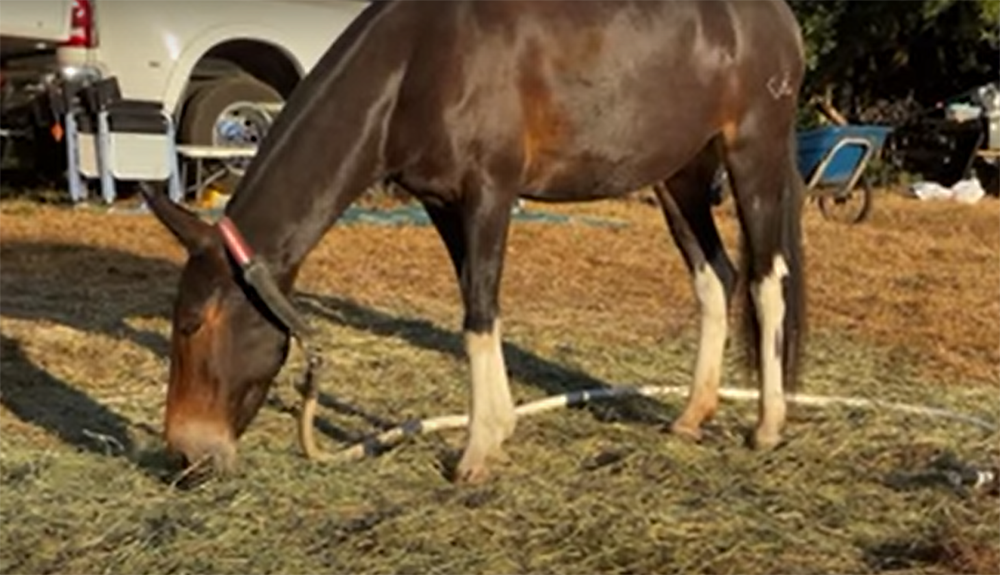
Swimming is only allowed in designated areas within the campground. Campers should be aware of these areas before they begin swimming. Additionally, lifeguards may be present in some of these designated areas.
Fishing is only allowed in certain areas of the campground. Again, it is important for campers to be aware of these areas before they begin fishing. Additionally, a valid fishing license is required in order to fish in the campground. [1]
Horseback riding is only allowed on designated trails within the campground. These trails are typically well-marked and easy to follow. However, it is important for riders to be aware of their surroundings at all times. Additionally, riders should always wear proper safety gear while riding.
Tips For Beginner Equestrian Campers
If you’re new to camping with your horse, there are a few things you should keep in mind. First, be sure to pack enough hay and grain for your horse. It’s also a good idea to pack some extra in case of emergency. Second, make sure you have the first-Aid kit for both you and your horse. You never know when you might need it! Finally, don’t forget to pack some fly spray. No one likes dealing with pesky insects!
Start With A Shorter Trip
Bring Your Own Water And Feed
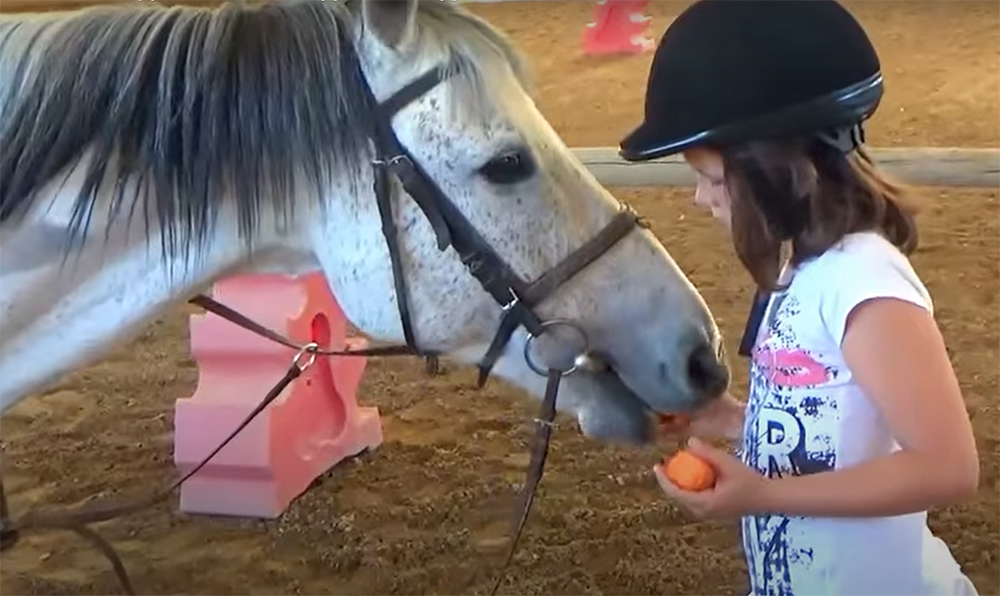
Equestrian camping is a great way to enjoy the outdoors with your horse. However, it’s important to be prepared and bring your own water and feed for your horse. There are a few things to consider when packing for your trip, such as how much hay and grain to bring, and whether or not you’ll need to pack salt blocks. You should also have a plan for dealing with waste since there won’t be any facilities at most campsites.
Equestrian camping can be a great adventure for you and your horse, but it’s important to be prepared before you go. With a little planning, you can make sure that both you and your horse have everything you need for a fun and safe trip.
Make Sure Your Horse Can Carry Your Gear
One of the first things you need to do when planning an equestrian camping trip is to make sure your horse can carry your gear. You’ll need to pack a saddle, bridle, and other tack, as well as food and water for both you and your horse. If you’re planning on camping in remote areas, you’ll also need to pack enough supplies for an emergency.
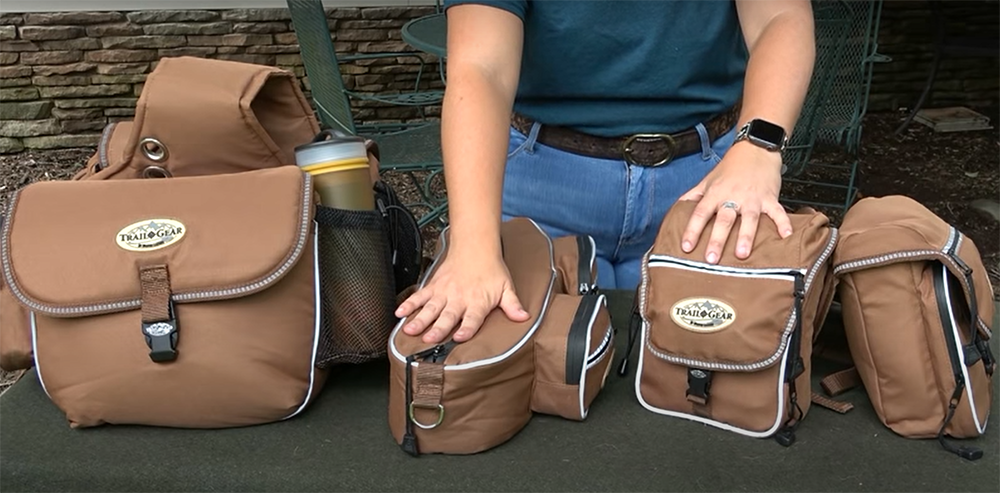
Once you’ve packed your gear, it’s important to make sure it’s all secured properly. Saddles and bridles should be fastened securely, and any loose items should be tied down so they don’t shift while you’re riding. If you’re unsure of how to properly secure your gear, ask an experienced horseman for help.
Get A Trailer
There are many different types and sizes of horse trailers on the market. Some trailers are designed for one horse while others can accommodate multiple horses. You will also need to decide if you want a bumper pull or gooseneck trailer. Bumper pull trailers attach to the back bumper of your vehicle while gooseneck trailers attach to the bed of your truck.
Once you have decided on the type of trailer you need, it is important to make sure that it is properly equipped. Your trailer should have hay racks, water tanks, and storage areas for grain and other supplies. It is also a good idea to invest in a ramp so that you can load and unload your horse with ease.
Get Your Horse Used To Camping
If you’re planning on taking your horse camping, there are a few things you’ll need to do to get them ready. First, you’ll need to get them used to being away from home. If they’ve never been away from home before, start by leaving them overnight at a friend’s house or at a boarding facility for helping them get used to being away from their usual surroundings and routine.
Next, you’ll need to introduce them to the idea of camping. Start by setting up a small tent in your backyard and spending some time in it with your horse. Let them explore the area and get used to the sights and sounds of camping. Once they’re comfortable with that, you can take them on a short camping trip, such as an overnight stay at a campground.
Finally, make sure they’re comfortable with the things they’ll encounter while camping, such as other animals and different types of terrain. If you have a horse that’s not used to being around other animals, start by taking them on short rides around your neighborhood or to a nearby park. This will allow them get used to being around other horses and animals. If you’re planning on camping in an area with different types of terrain, such as mountains or forests, take your horse on some short hikes before your trip so they can get used to the different footing.
Let Your Horse Have Creature Comforts
One of the best things about camping with your horse is that you can give them all the comforts of home. If you have a trailer, make sure to bring their favorite hay and some grain. You can even bring their water bucket from home so they have something familiar to drink from. Your horse will appreciate having these creature comforts while away from home.
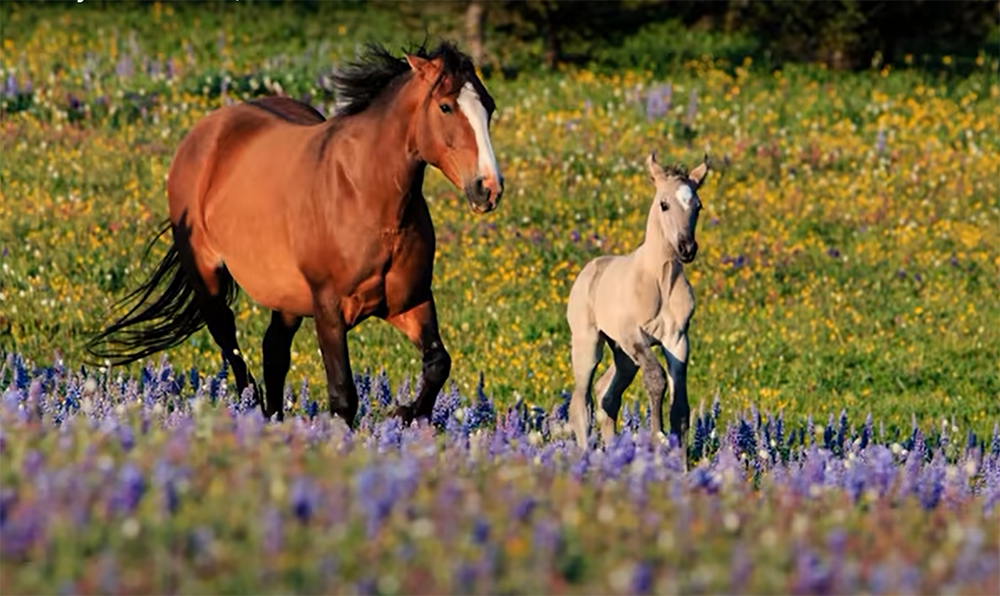
Another way is to set up their stall in a similar way to how it is at home. Bring any blankets or fly sheets that they use at home, and set up their stall in a quiet corner of the campsite. This will help your horse feel more relaxed and comfortable while away from home. [2]
Know How To Securely Contain Your Horse
One of the main concerns people have when they are thinking about bringing their horses camping is how to keep them safe and contained. The good news is that there are a number of ways to do this, and it doesn’t have to be complicated or expensive.
The most important thing is to make sure that your horse cannot get loose and run off. This means having a secure fence around your campsite, or if you are using a trailer, making sure the trailer is securely hitched and the doors are shut tight. If you are worried about your horse getting spooked by wildlife or other campers, you can also consider investing in a portable stall or pen. These can be set up at your campsite and will provide your horse with a safe space to stay.
Once you have a plan for containment, the next step is to think about food and water. Your horse will need access to hay or grass, and fresh water at all times. If you are camping in an area where there is no grass, you will need to bring hay with you. It’s also a good idea to bring along a bucket or two so your horse has access to water even if the campsite doesn’t have a water source.
Key Considerations When Camping with Horses
There are a few key things to keep in mind. Here are some tips to help you plan the perfect trip:
- Choose a campground that is horse-friendly: This means that the campground should have amenities like water and hay for your horse, as well as trails or an arena for riding.
- Make sure your horse is healthy and up-to-date on vaccinations: This is important for both the health of your horse and the safety of other horses at the campground.
- Pack everything you need for your horse: In addition to food and water, you’ll also need items like a halter, lead rope, brush, and hoof pick.
- Be prepared for the weather: If you’re camping in a hot climate, make sure to pack plenty of water and electrolytes for your horse. In colder climates, pack blankets and rain gear.
Camping with Horses Checklist for Beginners
Here’s a basic checklist of things you’ll need for camping with your horse:
- Horse trailer
- Hay and grain for your horse
- Water buckets
- Horse tack (saddle, bridle, etc.)
- Riding gear (helmet, boots, etc.)
- Camping gear (tent, sleeping bag, etc.)
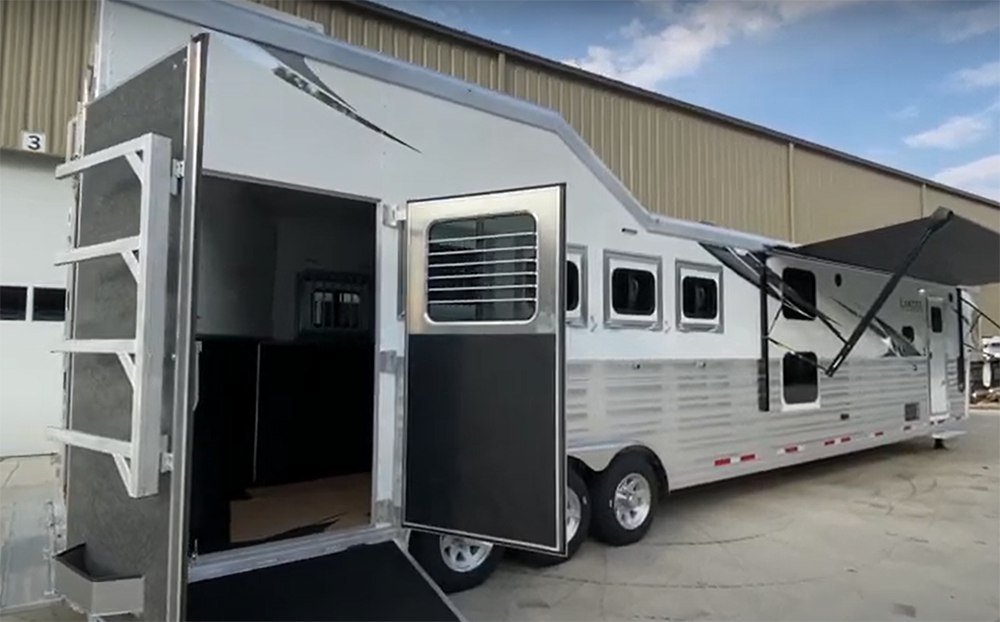
Safety and Navigation
Here are some safety tips to keep in mind when you’re camping with your horse:
- Be aware of your surroundings: When you’re riding, make sure to pay attention to your surroundings and look out for hazards like low-hanging branches or slippery footing.
- Stay on marked trails: Most campgrounds have marked trails that are safe for horses. Make sure to stay on these trails to avoid getting lost or hurt.
- Don’t ride alone: It’s always safer to ride with a buddy in case of an emergency.
- Tell someone where you’re going3: Before you head out on a ride, make sure to tell someone else at the campground where you’re going and when you’ll be back. That way, they can come looking for you if you don’t return on time.
People food
One of the golden rules of camping with horses is that people food is off limits. That means no sharing your s’mores with your horse! Horses are very curious creatures, and they will try to eat anything they can get their mouths on. Eating people food can be dangerous for horses, so it’s best to just keep it out of reach.
People equipment
Just like people food, horses should also not have access to people equipment. This includes things like tents, sleeping bags, and coolers. Horses are curious creatures and may try to nibble on these items, which can damage them. Additionally, horses are large animals and their movement can easily damage delicate camping equipment. So it’s best to just keep everything out of reach.
Horse food
One of the most important things to remember when camping with horses is to bring enough food for them. Horses are large animals and require a lot of food to stay healthy. Make sure to pack plenty of hay and grain, as well as water buckets and a first-aid kit.
Horse equipment
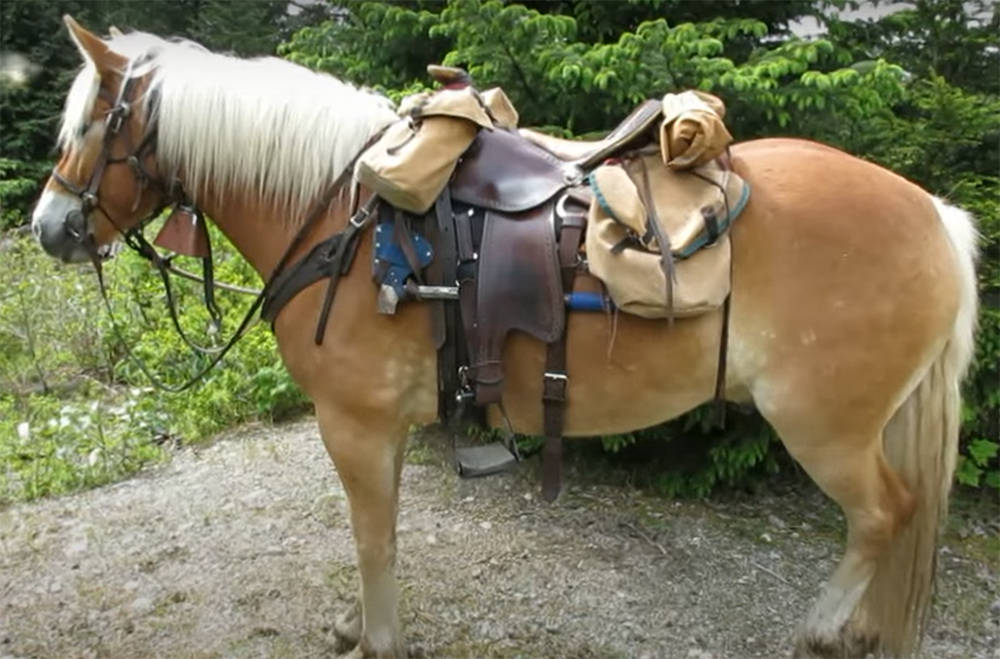
In addition to food, you’ll also need to bring some basic horse equipment with you on your trip. This includes things like a halter, lead rope, brush, and hoof pick. You should also pack a saddle and bridle if you plan on riding your horse while camping. [3]
FAQ
How to ward against pushing your horse too hard on trails?
One of the best ways to ward against pushing your horse too hard on trails is to make sure that you are both physically and mentally prepared for the ride. It is important to know your horse’s limits and not try to push them beyond their capabilities. If you are unsure about how far your horse can go, it is always best to err on the side of caution and turn back sooner rather than later. Another good way to avoid pushing your horse too hard is to be aware of the terrain and conditions on the trail. If the trail is particularly steep or rocky, it may be best to dismount and lead your horse instead. This will help prevent them from getting injured or overexerting themselves. Finally, make sure you are carrying plenty of water and food for both you and your horse in case the ride takes longer than expected.
How much does it cost to stay at an equestrian campground?
The price of staying at an equestrian campground can vary depending on the location, time of year, and amenities offered. However, expect to pay anywhere from $20-$50 per night. [4]
How do you tie a horse while camping?
You’ll want to use a highline to tie your horse while camping. You’ll need to find two trees that are about the same distance apart as your horse is tall. Then, you’ll run a rope between the two trees and secure it at the appropriate height. Finally, you’ll attach your lead rope to the highline and let your horse graze.
It’s important to check your horse’s highline regularly to make sure it hasn’t been rubbing or chafing on their coat. You should also give them plenty of hay to eat so they don’t get hungry overnight.
Can you camp with horses in National Parks?
Yes, you can camp with horses in National Parks! In fact, there are many beautiful trails and camping spots that are perfect for horseback riding. However, it is important to check with the park beforehand to make sure that they allow horses on their trails. Some parks may have certain restrictions in place, such as only allowing horses on certain trails or at certain times of year.
What are some good horse pack trip meals?
One of the best things about horse packing is that you can bring all your favorite foods with you! Planning ahead and packing easy-to-cook meals will make your trip much more enjoyable. Here are some great ideas for horse pack trip meals:
- Breakfast: oatmeal, breakfast burritos, pancakes
- Lunch: PB&J sandwiches, wraps, fruit and veggie plates
- Dinner: one pot meals like chili or spaghetti, foil packet dinners, dehydrated meals
- Snacks: granola bars, trail mix, fresh fruit and veggies [5]
Don’t forget to pack plenty of water and drinks for yourself and your horses. And always clean up after yourself to leave no trace!
What about feeding horses in the backcountry?
Horses are grazers, so they need to graze on grass for most of the day. If you’re camping in an area with no grass, you’ll need to bring hay for them to eat. You can either pack it in on your horse or in a vehicle.
Another thing to consider is water. Horses drink a lot of water, so you’ll need to make sure there’s a source of fresh water available for them. This could be a river, stream, or lake. If there isn’t any natural water source nearby, you’ll need to bring enough water for both you and your horse (or horses).
How much weight can my horse carry?
This is a common question asked by many first time riders. The answer unfortunately isn’t as simple as a certain number of pounds or kilograms. Every horse is different and can carry different weights based on their size, breed, and fitness level. As a general guideline, a healthy adult horse can carry up to 20% of their body weight. However, this number will be lower for younger horses or those that are not in peak physical condition. [6]
When packing for your camping trip, make sure to keep your horse’s carrying capacity in mind. You don’t want to overload them with too much gear and end up having to turn back early because they can’t handle it. If you’re not sure how much your horse can carry, ask your veterinarian or an experienced horseman for advice.
Another thing to consider when packing for your trip is the terrain you’ll be riding in. If you’re planning on doing a lot of uphill climbing, your horse will tire more easily than if you were just riding on flat ground. Make sure to pack light and only bring essential items so that your horse doesn’t get too tired during the journey.
Useful Video: What Is Equestrian Camping All About?
Conclusion
Equestrian camping is a great way to enjoy the outdoors with your horse. It can be a fun and rewarding experience for both you and your horse. With a little planning and preparation, you can make your trip a success. There are many different types of equestrian campsites available, so be sure to do your research before choosing one. Remember to pack plenty of supplies, including food and water for your horse, and be prepared for any weather conditions. Most importantly, have fun!
References:
- https://outforia.com/what-is-equestrian-camping/
- https://laienhaft.com/tips-for-noobs-equestrian-campers/
- https://horserookie.com/camping-with-horses-checklist/
- https://www.iowadnr.gov/Places-to-Go/State-Parks/Make-a-Reservation/Overnight-Camping
- https://scoscocam.wordpress.com/food/
- https://horseracingsense.com/how-much-weight-can-a-horse-carry/

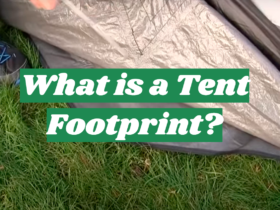
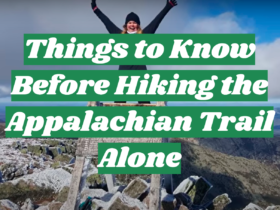
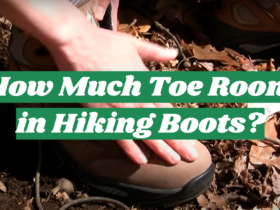
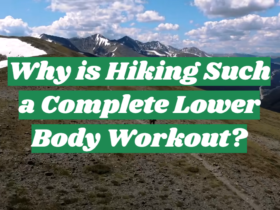
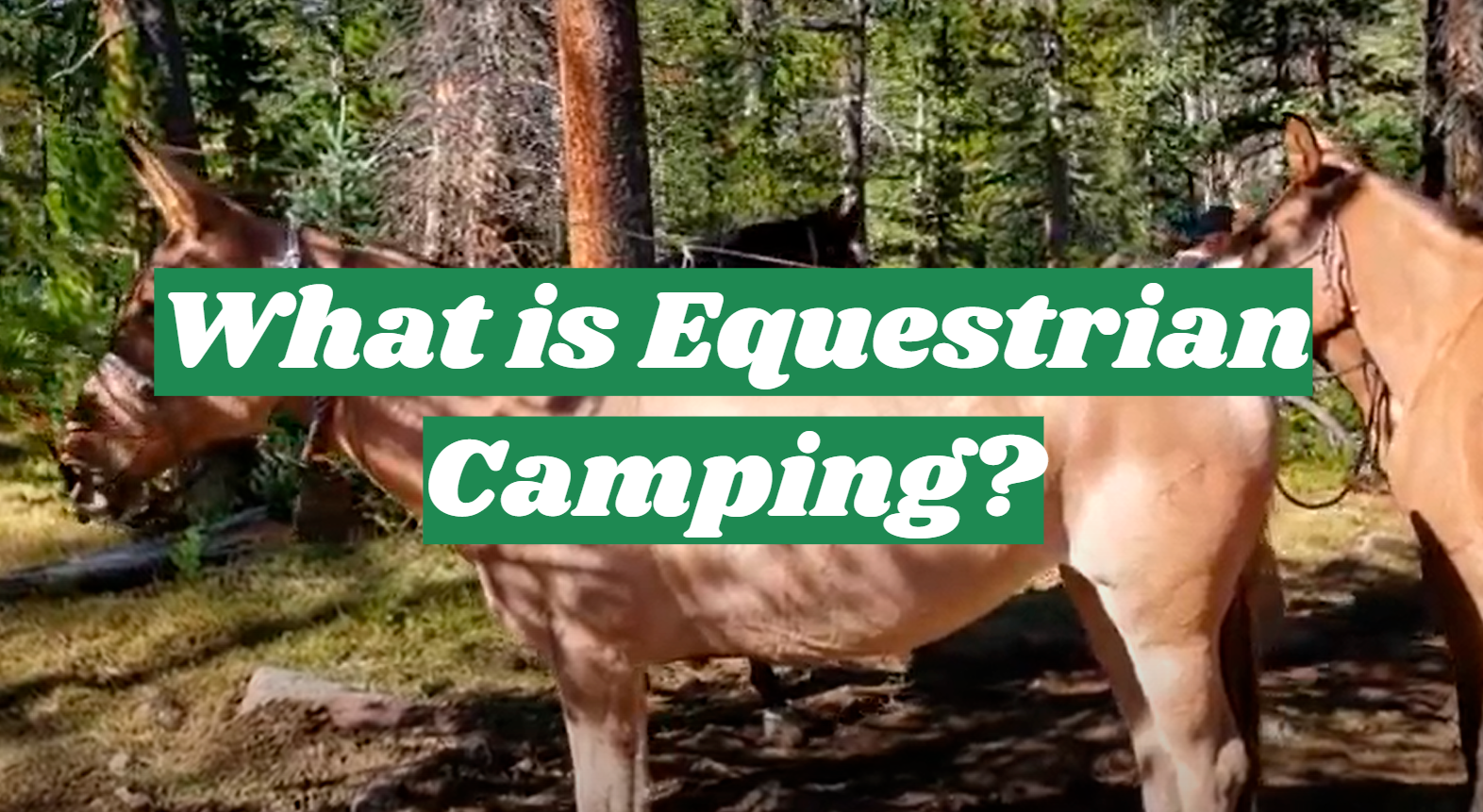
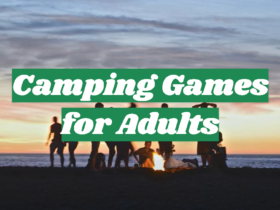
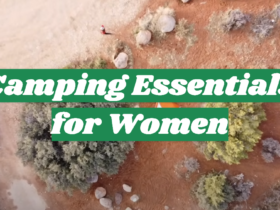
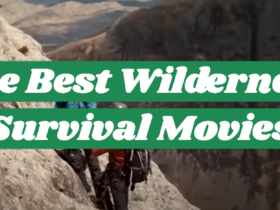
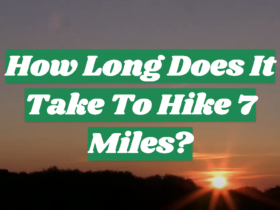
Leave a Review